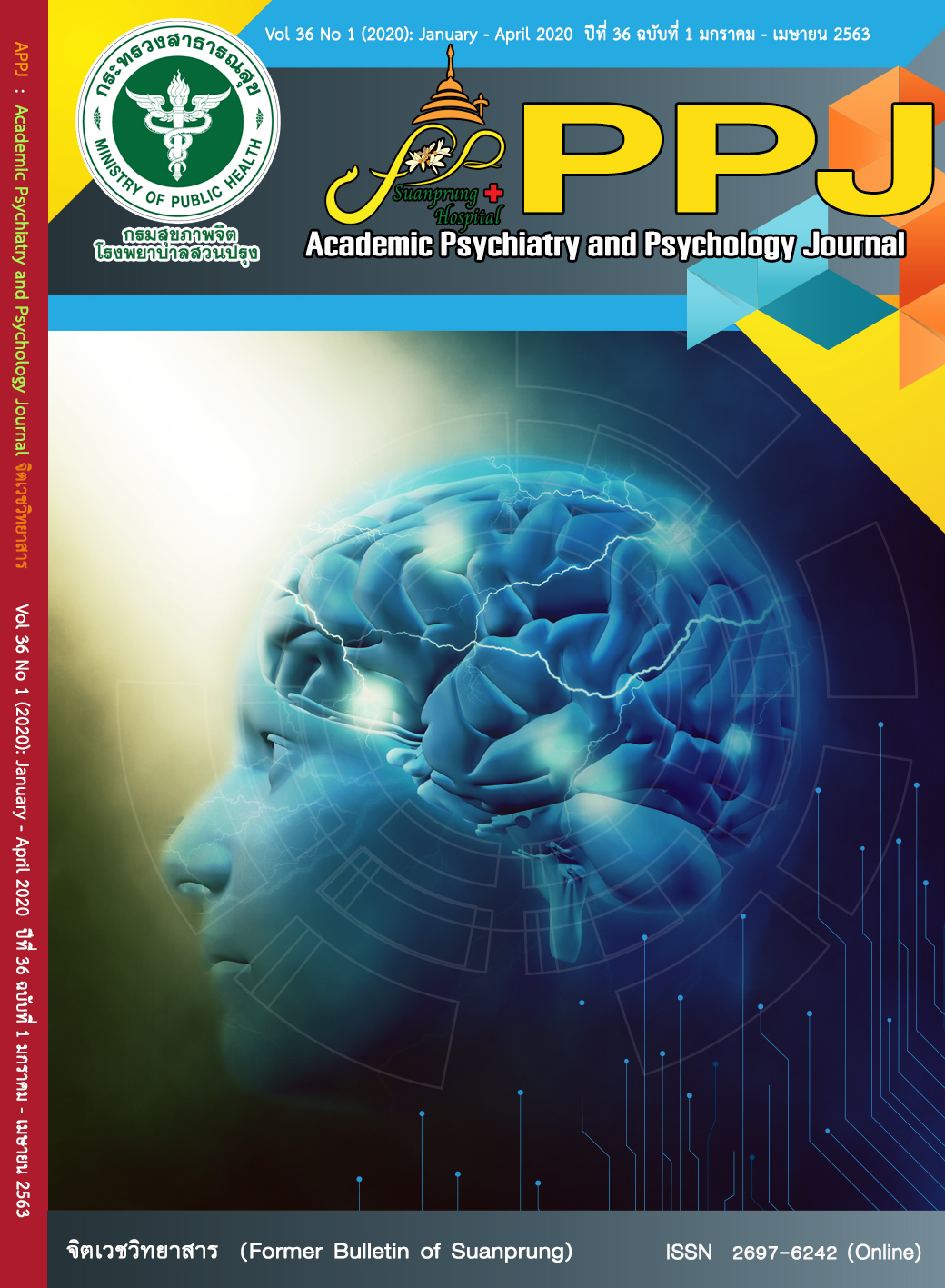Key Success Factors of The Mental Health Service Plan in Regional Health 1 and 2
Main Article Content
Abstract
Objective: To study the factors affecting the success of the mental health service plan
in regional health 1 and 2, including problems in the mental health service plan.
Methods: The study was conducted between 1 April – 30 June 2019, by collecting quantitative data from questionnaires answered by 163 executives and mental health personnel, which were analyzed with percentage frequencies. Qualitative data from structured interviews by purposive sampling for saturated data were analyzed according to content analysis and interpretation. The study also included the analysis of secondary data, which were performance reports from the annual reports of the Department of Mental Health.
The results of quantitative data by 122 respondents. 74.8% found that the level of opinions on the policy, executive personnel, availability of work systems (personnel, places, psychosocial care, promotion, prevention, drug system, referral arrangement and continued care) were at a high level. As for the diagnosis, communication, human resources support, budget and equipment were at a moderate level. The participation of personnel in public health was at a high level. The outside unit was at a moderate level. Qualitative data from 35 structured interviews found that factors affecting the success of the mental health service plan in regional health 1 and 2 were policy indicators, all executives, personnel, availability of work systems and the cooperation of networks in all sectors. Problems in mental health service were workload, executives’ more emphasis on physical health issues than mental health issues, problems of collecting mental health indicators, availability of work systems, places, budget and the cooperation of networks in all sectors. Other problems were database system and stigma.
Conclusion: When prioritizing the factors affecting the success and problems of the mental health service plan, it was found that the first 3 issues that were consistent policy indicators, executive and personnel.
Article Details

This work is licensed under a Creative Commons Attribution-NonCommercial-NoDerivatives 4.0 International License.
บทความหลังผ่านการปรับแก้จากกองบรรณาธิการแล้ว เป็นลิขสิทธ์ของวารสารจิตเวชวิทยาสาร โรงพยาบาลสวนปรุง กรมสุขภาพจิต กระทรวงสาธารณสุข ห้ามเผยแพร่เพื่อประโยชน์ทางการค้าโดยไม่ได้รับอนุญาต แต่อนุญาตให้เผยแพร่บทความดังกล่าวเพื่อประโยชน์ทางการศึกษาแก่ประชาชนทั่วไป ทั้งนี้กองบรรณาธิการไม่จำเป็นต้องเห็นด้วยกับบทความหรือข้อคิดเห็นใดๆ ที่ปรากฏในวารสารสวนปรุง
References
Vigo D, Thornicroft G, Atun R. Estimating the true global burden of mental illness. Lancet Psychiatry 2016;3(2):171-8.
World Health Organization. The world health report 2001: Mental health: new understanding, new hope. Geneva: WHO; 2001.
Kittirattanapaiboon P, Tantirangsee N, Chutha W, Tanaree A, Kwansani P, Assanangkornchai S, et al. Prevalence of mental disorders and mental health problems: Results from Thai national mental health survey 2013. Bureau of Mental Health Service Administration, Department of Mental Health: Beyond Publishing; 2016.
Prkkkanone B, Sirisamutr T, Doungthipsirikul S, Puangladda S, Sudsiwilai K. The epidemiology survey on mental health disorders in 5 priority areas of a comprehensive intervention program (mhGAP intervention program) under the universal health coverage scheme. Nonthaburi: Office of the Secretariat to the National Mental Health Commission (OMHC), Department of Mental Health; 2013.
Bureau of registration administration. Mid-year population 2018. Department of Provincial Administration; 2019. Available from: https://www.bps.moph.go.th/new_ bps/sites/default/files/ pop61_v2.xls. [2019 Mar 8].
Bureau of Health Administration, Office of the Permanent Secretary Ministry of Public Health. Service system development plan of mental health and psychiatry (Service Plan). Bankok:The Agricultural cooperative federation of Thailand; 2013.
Mahatnirunkul S, editor. Guideline for mental health and psychiatric service implementation plan for primary, secondary and tertiary health care levels. Chiangmai: Suanprung Psychiatric Hospital; 2012.
Office of the Permanent Secretary Ministry of Public Health. Documentation manual /details of the indicators for inspecting 2017. Available from: http://www.dmh.go.th/ regulator/ebook/Files/เอกสารคู่มือ/รายละเอียดตัวชี้วัดตรวจราชการงานสุขภาพจิต%20 (คณะ2%20ระบบบริการ)%20ปี%202560.pdf [2018 Oct 9].
Department of Mental Health. Annual report 2012-2018. Department of Mental Health; 2019.Available from://www.dmh.go.th/report/dmh/rpt_year.[2019 May 9].
Khonkaen Rajanagarindra Hospital. Suicide rate report per hundred thousand population 2012-2018 . Department of Mental Health; 2019. Available from: https:// www.dmh.go.th/ report/suicide/download. [2019 May 9].
Srireunthong W, Wiroteurairuang K, Thanee T, Saguanrum K. Evaluation research
on psychiatric patients service development project for the Public Health Region 10.J Health Sci 2017;26(2):362-71.
Sriprasert P. Key success factors of service plan in regional health center No 8, Thailand. J Health Sci. 2015;24:696-707.
Tangcharoensathien V, Witthayapipopsakul W, Panichkriangkrai W, Patcharanarumol W, Mills A. Health systems development in Thailand: a solid platform for successful implementation of universal health coverage. Lancet. 2018 Mar 24;391(10126):1205-23.[2019 Jan 31].
Thanyawinichkul P, et al. Health service system development : Case study of Chiangmai Provincial Public Health Office 2013-2016. 2019. Available from: https://m.facebook. com_story.php?story_fbid=10218120688949943&id=1269547942. [2019 Feb12]
Pachanee K, Kittidilokkul S, Poungkantha W, Onsuwan D, Panichkriangkrai W,
Patcharanarumol W. How Thailand achieved ‘good health at low cost’?.J Health Sci. 2014;23(1):137-46.
Vongmanee K and Noosorn N. Lessons learned district health system model for health promotion district in mental health Lomsak district Phetchaboon province. Journal of Nursing and Health Care 2017;35(3):232-41. (in Thai)
Chamaram S. Factors influencing the success of applying good governance in
Management of Buddhism office in the northeastern region (Master of Public Administration Thesis). Nonthaburi: SukhothaiThammathirat University; 2011.
World Health Organization. Monitoring the building blocks of health systems: A handbook of indicators and their measurement strategies. Geneva: WHO; 2010.
Department of Mental Health. Framework for mental health development and the strategic plan of the Department of Mental Health during the economic development plan and the National Society, Issue 11(2012 - 2016). 2ndrev.ed. Bangkok: Lamom; 2011.
Suraaroonsamrit B, Panyayong B. The development of mental health and psychiatric service in health areas. J Ment Health Thai 2014;22:142-56.
Nutdechanan Y. Factors affecting the success of organization development according to criteria public administration quality of the Department of Mental Health, Ministry of PublicHealth; 2015. Available from: http://www.dmh.to.th/ebook/files/ปัจจัยที่มีผลต่อความสำเร็จองค์กร%20PMQA.pdf. [2018 Sep 8].
Jirapramukpitak T. Mental health gap and related economic burden: A longitudinal communitysurvey. Health system research report; 2017. Available from: http://kb. hsri.or.th/dspace/ handle/11228/4699?locale-attribute=th. [2018 Sep 8].

